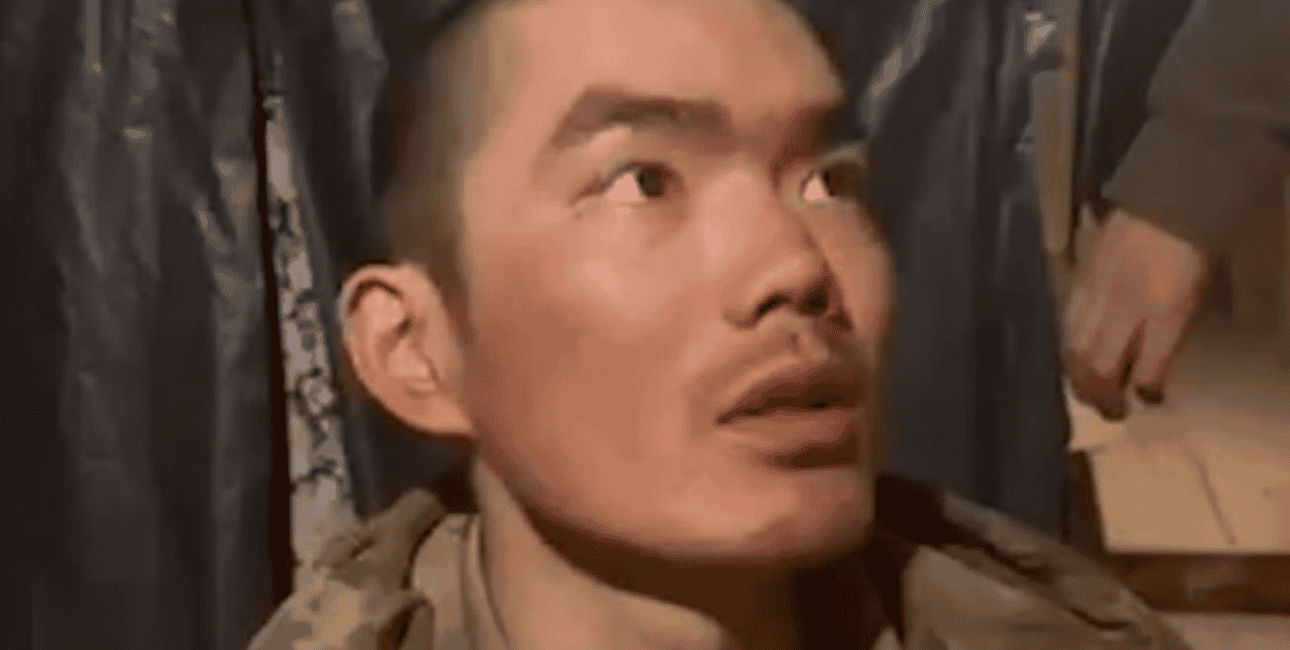Two alleged Chinese nationals captured in Ukraine for fighting with the Russian Army have claimed that they were “deceived” by the false promises made by Russia on social media, warning fellow countrymen not to join Moscow’s war effort. Meanwhile, Ukrainian President Volodymyr Zelensky has claimed that “several hundred” Chinese citizens are fighting on Russia’s side in Ukraine.
The Chinese nationals, Wang Guangjung, 34, and Zhang Renbo, 27, were captured in Ukraine earlier this month, marking the first time when Ukrainian armed forces arrested Chinese citizens for fighting with Russia in the Ukraine war.
In a press conference, organized by Ukraine’s Security Service, the two mercenaries spoke about how they came to fight in the war and eventually became prisoners of war (POWs).
Wang said he was in China, flipping through TikTok, when he saw an advertisement to join the Russian army. After losing his job last summer, he was interested in the offer, especially since, he said, military service is seen as “prestigious” in China.
He was promised 200,000 to 250,000 Russian rubles (US$2,000-US$3,000) per month in the Russian army, which is higher than the average salary in China.
However, Wang said he never received the money. He claimed that the Russians took his bank card and mobile phone, so he had no way to access his wages.
Zhang, who previously worked as a firefighter in China, claimed that he came to Russia in December 2024 to work in the construction sector. However, he later enlisted in the Russian military and was deployed to the frontlines.
Notably, both of them said that they also encountered several foreign fighters in the Russian Army, including from Central Asia, Ghana, and Iraq.
They further said that they joined the Russian Army out of their own free will, and the Chinese government had no role in it.
Wang also claimed that he didn’t kill any Ukrainian soldiers. He claimed he had spent only three days at the front line when he was captured.
“Everything we heard from the Russians was a lie,” both men said during the press conference. “It turned out that Russia is not that strong, and Ukraine is not that weak. That’s why it’s better not to participate in wars at all.”
Both men also warned fellow citizens not to join Russia’s war. “For those (Chinese) citizens who want to take part in the war, we want to say that they should not do so,” Wang was quoted as saying by the Kyiv Independent.
However, it is difficult to discern how much of it was sincere, as they were in Ukraine’s captivity.
“Real war is completely different from what we have seen in movies and on TV,” said Wang. “I regret one thing — I want to apologize to my parents. And my only wish is to go back (to China) and follow all the instructions that will help me do that.”
Chinese Citizens In The Russian Army
The two alleged Chinese citizens were captured by Ukrainian forces earlier this month. Speaking on their arrest, Zelensky had claimed that these were not isolated incidents and several hundred Chinese citizens are fighting in the Russian Army.
“It is crystal clear that these are not isolated cases but rather systematic Russian efforts, in particular on the territory and within the jurisdiction of China, to recruit citizens of that country for the war,” Zelensky said on the platform X.
According to Zelensky, Ukrainian intelligence has information on 155 Chinese nationals fighting for the Russian military, and the actual number is believed to be even higher.
Speaking to journalists in Kyiv, he said that Russia is recruiting Chinese citizens via social media platforms and that officials in Beijing are aware of the process. Ukraine, he added, is still trying to determine whether the recruits are receiving instructions directly from the Chinese government.
China Denies State Involvement, Urges Caution
The Chinese government has denied the allegations. Speaking at a press briefing in Beijing last week, foreign ministry spokesperson Lin Jian dismissed Zelensky’s claims as “groundless” and reaffirmed China’s neutral position in the conflict.
“China is neither the creator nor a party to the Ukrainian crisis. We are a staunch supporter and active promoter of the peaceful resolution of the crisis,” Lin said. He reiterated that China has consistently urged its citizens to avoid conflict zones and refrain from taking part in military operations abroad.

Zelensky/Telegram.
While Beijing did not dispute the presence of Chinese nationals in Ukraine, it indicated that any involvement would be in a personal capacity. Chinese authorities stated that they are not aware of any state-sanctioned program to send nationals to fight in the war.
Beijing’s reaction comes amid ongoing scrutiny over its trade and technological links with Moscow. Beijing has also been criticized for exporting dual-use technology items like computer chips and drones that can serve both civilian and military purposes to Russia.
Foreign Nationals On Both Sides Of The Conflict
Since the full-scale invasion began in February 2022, both Russia and Ukraine have relied on foreign nationals, albeit through very different mechanisms.
In the early stages of the war, Ukraine created the International Legion for the Territorial Defense of Ukraine, inviting foreign volunteers to join its forces.
Thousands of citizens from countries like the United States, the United Kingdom, Georgia, France, Germany, and Canada joined the legion. While many of them had previous combat experience, others were civilians motivated by solidarity with Ukraine.
On the other hand, Russia has drawn foreign fighters through less formal channels. Reports indicate that Moscow has recruited labor migrants, citizens from developing countries, and even prisoners, often through coercion or misleading job advertisements. Some have been offered money, residency, or the promise of Russian citizenship.
Apart from China, there have been confirmed reports of North Korean, Indian, Nepali, Cuban, and Syrian nationals fighting for Russia. Earlier this year, Ukrainian forces captured two North Korean soldiers in the Kursk region. According to Ukrainian intelligence, these individuals had been deployed to support logistical operations along the border.
Officially, North Korean troops make up the highest number of troops. In October 2024, Pyongyang sent approximately 12,000 of its soldiers to Russia. Since then, North Korean forces have been involved in combat operations and taken significant losses.
Earlier this year, it sent 3,000 more soldiers to bolster Russia’s war.
Nepal has officially confirmed that at least 14 of its citizens have been killed while fighting for Russia, and many others are missing. Russia has reportedly recruited as many as 15,000 Nepalis to fight its war.
The Nepali government has requested Moscow to stop recruiting its citizens and has demanded the return of bodies and compensation for the families of the deceased. Russia has reportedly stopped recruiting Nepalese nationals for its army and terminated the contracts of those currently serving.
India has faced similar concerns. Families of several Indian men have come forward alleging that their relatives were tricked into joining the Russian army after being promised jobs as security personnel. In March, India asked Russia to immediately halt the recruitment of Indian nationals and facilitate the return of those already enlisted.
In 2023, Cuba said it had uncovered a human trafficking ring that was sending Cuban nationals to fight in Ukraine. A few months later, Cuban authorities confirmed that multiple individuals had been detained for facilitating the recruitment.
Scale And Impact Of Foreign Fighters’ Involvement
There is no official database or confirmed number of foreign nationals fighting in the Russia-Ukraine war. However, the growing number of such cases suggests that the issue is more widespread than previously acknowledged.
Estimates from early in the war suggested that around 20,000 foreigners had volunteered to fight for Ukraine, though many returned home due to the harsh conditions, lack of training, or disillusionment.
Russia’s use of foreign nationals appears more complex. In addition to traditional military contracts, private military companies like the Wagner Group have played a key role.
These organizations have recruited from African countries, the Middle East, and post-Soviet states. The line between voluntary participation and forced conscription is often blurred, especially for individuals from economically vulnerable backgrounds.
Some of these recruits have reported being mistreated by Russian forces and forced to fight on the frontlines in freezing cold conditions, while Russian soldiers stayed behind in their camps.
The recruitment of individuals from neutral or third-party countries, especially through coercion or deception, can trigger diplomatic disputes and affect bilateral relations.
While Beijing and Moscow have maintained close economic and political ties throughout the conflict, China has consistently sought to portray itself as a neutral party advocating peace.
If evidence emerges that large numbers of Chinese citizens are participating in the war, especially through organized channels, it could further strain China’s ties with the West and undermine its credibility as a peace broker.
What Comes Next?
Russia dismissed Zelensky’s remarks about Chinese nationals fighting for Moscow, asserting that his claims were inaccurate.
“Zelensky is mistaken,” Kremlin spokesperson Dmitry Peskov said during a press briefing, adding that China has consistently maintained a balanced stance and remains a partner, friend, and ally to Russia.
The presence of a few Chinese citizens in the Russian Army also does not prove the Chinese state’s involvement or active participation. However, for now, this development has raised concerns about how the Russia-Ukraine war has drawn in actors beyond its immediate geography.
- Via: ET News Desk
- Mail us at: editor (at) eurasiantimes.com




